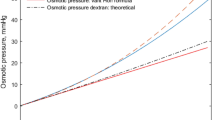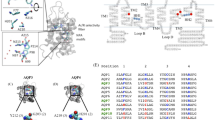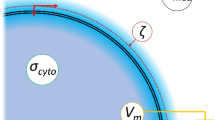Abstract
CLASSICAL interpretations of the mechanism of water transport across mammalian red cell membranes assume the existence of aqueous membrane pores1–3. As the permeability coefficient to water measured under an osmotic pressure gradient is usually significantly higher than the corresponding value measured under diffusional flow, the human red cell membrane is thought to act both as a selective solvent and a molecular sieve. Its ability to function as a molecular sieve depends on the existence of the pores, which could be assembled from aggregates of integral membrane proteins which span the membrane4. It is generally agreed that at least two proteins span the human red cell membrane5–7. Using polyacrylamide gel electrophoresis we have found that a band which contains one of these proteins is selectively labelled by a water-transport inhibitor.
This is a preview of subscription content, access via your institution
Access options
Subscribe to this journal
Receive 51 print issues and online access
$199.00 per year
only $3.90 per issue
Buy this article
- Purchase on Springer Link
- Instant access to full article PDF
Prices may be subject to local taxes which are calculated during checkout
Similar content being viewed by others
References
Solomon, A. K., J. gen. Physiol., 51, 335 S (1968).
Sha'afi, R. I., Rich, G. T., Sidel, V. W., Bossert, W., and Solomon, A. K., J. gen. Physiol., 50, 1377 (1967).
Sha'afi, R. I., and Gary-Bobo, C. M., Prog. Biophys. molec. Biol., 26, 105 (1973).
Singer, S. J., A. Rev. Biochem., 44, 866 (1974).
Bretscher, M. S., Science, 181, 622 (1973).
Segrest, J. P., Kahane, I., Jackson, R. L., and Marchesi, V. T., Archs biochem. Biophys., 155, 167 (1973).
Steck, T. L., Fairbanks, G., and Wallach, D. F. H., 10, 2617 (1971).
Naccache, P., and Sha'afi, R. I., J. Cell Physiol., 84, 449 (1974).
Macey, R. I., and Farmer, R. E. L., Biochim. biophys. Acta, 211, 104 (1970).
Macey, R. I., Karan, D. M., and Farmer, R. E. L., in Passive Permeability of Cell Membrane (edit. by Krenzer, F., and Segers, J. F. G.), 331, (Plenum, New York, 1972).
Rothstein, A., in Topics in Membrane and Transport (edit. by Bronner, F., and Kleinzeller, A.) 1, 15 (1970).
Fairbanks, G., Steck, T. L., and Walach, D. F. H., Biochemistry, 10, 2606 (1971).
Cabantchik, Z. I., and Rothstein, A. J. Membrane Biol., 15, 207 (1974).
Cabantchik, Z. I., and Rothstein, A. J. Membrane Biol., 15, 227 (1974).
Avruch, J., and Fairbanks, C., Proc. natn. Acad. Sci. U.S.A., 69, 1216 (1972).
Knauf, P. A., Proverbio, F., and Hoffman, J. F., J. gen. Physiol. (in the press).
Author information
Authors and Affiliations
Rights and permissions
About this article
Cite this article
BROWN, P., FEINSTEIN, M. & SHA'AFI, R. Membrane proteins related to water transport in human erythrocytes. Nature 254, 523–525 (1975). https://doi.org/10.1038/254523a0
Received:
Revised:
Published:
Issue Date:
DOI: https://doi.org/10.1038/254523a0
This article is cited by
-
Effect of methyl isocyanate on rabbit cardiac Na+, K+-ATPase
Archives of Toxicology (1995)
-
Nature of the water channels in the internodal cells ofNitellopsis
The Journal of Membrane Biology (1990)
-
Effect of mercurial compounds on net water transport and intramembrane particle aggregates in ADH-treated frog urinary bladder
The Journal of Membrane Biology (1989)
Comments
By submitting a comment you agree to abide by our Terms and Community Guidelines. If you find something abusive or that does not comply with our terms or guidelines please flag it as inappropriate.



